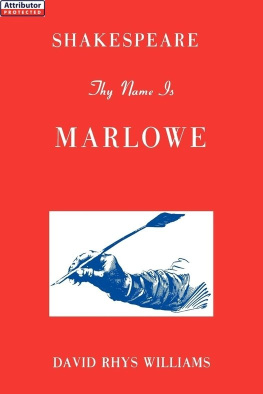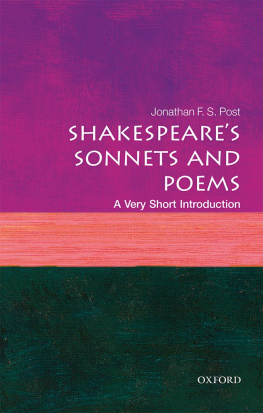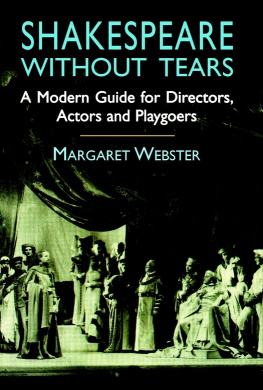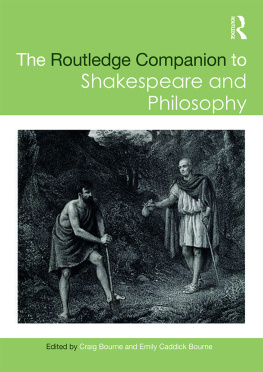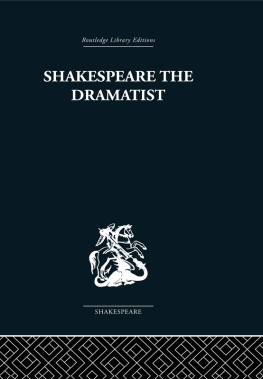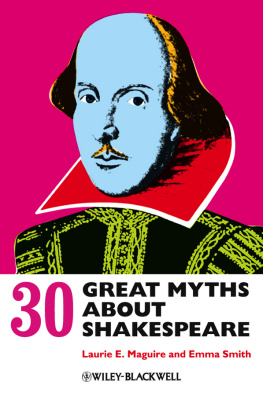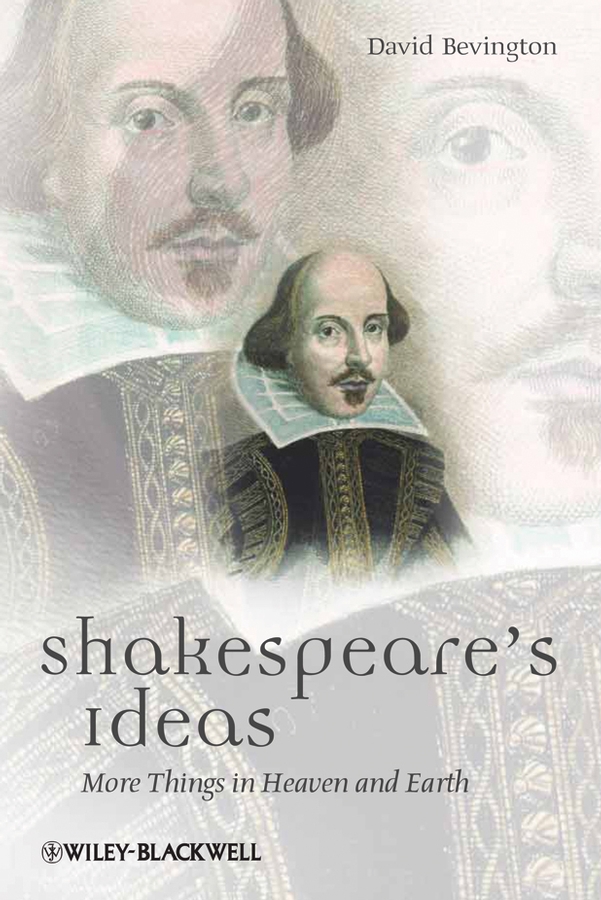

Blackwell Great Minds
Edited by Steven Nadler
The Blackwell Great Minds series gives readers a strong sense of the fundamental views of the great western thinkers and captures the relevance of these figures to the way we think and live today.
Kant by Allen W. Wood
Augustine by Gareth B. Matthews
Descartes by Andr Gombay
Sartre by Katherine J. Morris
Charles Darwin by Michael Ruse
Schopenhauer by Robert Wicks
Shakespeares Ideas by David Bevington
Forthcoming
Camus by David Sherman
Kierkegaard by M. Jamie Ferreira
Mill by Wendy Donner and Rchard Fumerton
This edition first published 2008
2008 David Bevington
Blackwell Publishing was acquired by John Wiley & Sons in February 2007. Blackwells publishing program has been merged with Wileys global Scientific, Technical, and Medical business to form Wiley-Blackwell.
Registered Office
John Wiley & Sons Ltd, The Atrium, Southern Gate, Chichester, West Sussex, PO19 8SQ, United Kingdom
Editorial Offices
350 Main Street, Malden, MA 02148-5020, USA
9600 Garsington Road, Oxford, OX4 2DQ, UK
The Atrium, Southern Gate, Chichester, West Sussex, PO19 8SQ, UK
For details of our global editorial offices, for customer services, and for information about how to apply for permission to reuse the copyright material in this book please see our website at www.wiley.com/wiley-blackwell.
The right of David Bevington to be identified as the author of this work has been asserted in accordance with the UK Copyright, Designs, and Patents Act 1988.
All rights reserved. No part of this publication may be reproduced, stored in a retrieval system, or transmitted, in any form or by any means, electronic, mechanical, photocopying, recording or otherwise, except as permitted by the UK Copyright, Designs, and Patents Act 1988, without the prior permission of the publisher.
Wiley also publishers its books in a variety of electronic formats. Some content that appears in print may not be available in electronic books.
Designations used by companies to distinguish their products are often claimed as trademarks. All brand names and product names used in this book are trade names, service marks, trademarks, or registered trademarks of their respective owners. The publisher is not associated with any product or vendor mentioned in this book. This publication is designed to provide accurate and authoritative information in regard to the subject matter covered. It is sold on the understanding that the publisher is not engaged in rendering professional services. If professional advice or other expert assistance is required, the services of a competent professional should be sought.
Library of Congress Cataloging-in-Publication Data
Bevington, David M.
Shakespeares ideas : more things in heaven and earth / David Bevington.
p. cm. (Blackwell great minds)
Includes bibliographical references and index.
ISBN 978-1-4051-6795-6 (hardcover : alk. paper) - ISBN 978-1-4051-6796-3
(pbk. : alk. paper)
1. Shakespeare, William, 1564-1616-Philosophy. I. Title.
PR3001.B48 2008
822.33dc22
2008006980
A catalogue record for this title is available from the British Library.
To Stanley Wells
Acknowledgements
My chief debt is to those scholars and critics whom I list in the Further Reading section of this book. What I have written in this book reflects a lifetime of reading and teaching and intellectual conversation, without which I fear I would have learned little. Among those to whom I am most indebted, I should mention Alfred Harbage (my mentor of graduate school days), Sam Schoenbaum, Maynard Mack, Northrop Frye, C. L. Barber, Copplia Kahn, David Kastan, Fredson Bowers, Arthur Kirsch, Frank Kermode, Barbara Mowat, Janet Adelman, Richard Wheeler, and Stanley Wells, to the last of whom this book is affectionately dedicated. The list here is manifestly inadequate; my obligation is much wider than that. I am most of all indebted to the spirit of collegiality that thrives in the world of Shakespeare studies and at the great universities (Harvard University, the University of Virginia, the University of Chicago, Northwestern University, the University of Hawaii, Dominican University, the University of Victoria) where I have been privileged to teach.
A Natural Philosopher
TOUCHSTONE Hast any philosophy in thee, shepherd?
CORIN No more but that I know the more one sickens the worse at ease he is; and that he that wants money, means, and content is without three good friends; that the property of rain is to wet and fire to burn; that good pasture makes fat sheep and that a great cause of the night is lack of the sun; that he that hath learned no wit by nature nor art may complain of good breeding or comes of a very dull kindred.
TOUCHSTONE Such a one is a natural philosopher.
(As You Like It, 3.2.2130)
Even if Shakespeare was not a philosopher in the sense of writing essays or treatises arguing philosophical positions and proposing an embracing philosophical scheme, we need to take the ideas in his plays and poems seriously. This book is dedicated to the proposition that the writings of Shakespeare reveal the workings of a great mind. True, we have no literary criticism or other theorizing as such from his pen. Unlike his near-contemporary Ben Jonson, whose theories of dramatic art are loudly proclaimed in prologues, manifestos, satirical diatribes, and recorded conversations, Shakespeare never speaks in his own voice about his ideas on writing or on what we would broadly call his philosophy. That is because he is a dramatist with a special genius for allowing his characters to speak on their own behalfs without his editorial intervention.
Shakespeare does not discuss philosophers very often, and may not have read widely in them. He cites Aristotle twice in throwaway comments (see Chapter 4). He never mentions Plato or his Academy. Socrates appears once by name as the hapless henpecked husband of Xantippe (The Taming of the Shrew, 1.2.6970). Shakespeares four references to Pythagoras seem to regard his ideas as a bizarre joke. Seneca is named once as the quintessential heavy dramatist, not as a philosopher (Hamlet, 2.2.400). Although the concept of stoicism is important to Shakespeare, as we shall see in Chapter 6, he uses the word stoics only in a single comic remark to characterize students who prefer diligent study to fun and games (Taming, 1.1.31), and he says nothing about Zeno or his followers. Sceptic, sceptical, and scepticism form no part of Shakespeares vocabulary, however much he may have pondered what we would call sceptical ideas, nor does he name Pyrrhon or Pyrrhonism or Sextus Empiricus. Shakespeare tends to use epicurean in its slang sense of hedonistic. Medieval theologians like Abelard, Eusebius, Tertullian, Augustine, Thomas Aquinas, William of Ockam, and Duns Scotus are nowhere to be found. So too with Renaissance neoplatonists like Pico della Mirandola, Marsilio Ficino, and Baldassare Castiglione, or radical thinkers like Giordano Bruno. Lutheran surfaces once (Henry VIII, 3.2.100) as a defamatory Catholic-inspired label for Anne Bullen. John Calvins name is absent, even though his widely-circulated ideas are discernible. Machiavel turns up thrice as a synonym for villain or political intriguer. We hear nothing of Agrippa, or Paracelsus, or Ramus. Shakespeare never names Montaigne, although his debt to one essay at least is evident in
Next page

